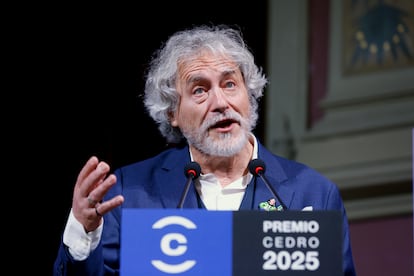Manuel Rivas arrived this Friday at the Athenaeum of Madrid with his navy blue suit, stripped of a tie and with a brooch at the flap of the two Marias (two popular sisters during Franco in Santiago de Compostela). Dismembered and smiling, as you usually see. He received greetings in Gallego from those who crossed him, as recognizing in him a representative of the language he writes. On Wednesday he signed in Sant Jordi copies of his latest book, Behind heavenand this Friday was presented in Madrid to receive the Cedro Prize, that the Spanish Center for Reprographic Rights grants, symbolically, to the trajectory of a person or institution that highlights to defend culture in general and copyright in particular.
Rivas spoiled from the beginning, and as if he felt at home, it all started with the guitar of Álvaro Toscano interpreting Black Shadowfrom Rosalía de Castro, the Santiago poet, and with music by Juan Montes. It was advanced by Carme Riera, president of Cedro: “Talking about Manuel is Habar de Galicia and Galician.” From the hands of Riera and those of the second vice president of the government, Yolanda Diaz, the writer received the award, materialized in a bronze figure with a cedar drawn.
“I am here to thank. Thank you for the prize, but above all to people who permanently defend copyright,” Rivas said. He then articulated a speech around the one that became the great theme of the afternoon: the use of generative artificial intelligence in culture. “What is at stake is not the intellectual heritage, which also, what is at stake is a defeat of humanity. Without regulation and without an effective ethic of empathy, there is the real danger that the new technological emporiums propitiate a great plunder of the intellectual and creative heritage.” And took advantage of the presence of his countryman in the government to warn: “Spain must be a avant -garde space when regulating the use of new technologies and guaranteeing the rights of creators based on consent, transparency and monetization. Defending intellectual heritage is also to defend a decent society and an advanced democracy.”
He spoke of that technological wave that “it will have a terribly destabilizing effect, taking many professions ahead,” and directly held the world’s leaders and magnates: “This reminds me of what Gustave Flaubert said: he said he would like to live in a ivory tower, but from time to time an avalanche of avalanche appeared shit. If those who are in the command post do not offer another direction than the uncertainty, while fighting for the best cabins of the TitanicHow not to expect an avalanche of shit?”.
The speech would not be from Manuel Rivas, a fervent environmental militant, if he did not also talk about the environment. “The entire planet is, in different intensities, in a risk line. We live an emergency situation. An era ‘Mayday’ of ecological extraimitation. And to the environmental planetary crisis is added a process of dehumanization imposed on the coup of algorithm,” he said about the care for the world, which he has, and reflects it in his lyrics, so much love.
Perhaps the narrative led Rivas to its most popular success, but the writer is also a poet, screenwriter, essayist and journalist. “A poet who does not resist only to be a poet,” as Juan Cruz defined it in a video projected in the auditorium and in which friends of the writer and his two children also participated. To his credit are works such as In wild company, What do you love me, love?, The carpenter pencil, Journalism is a story o The low voicesan autobiography where the origin of his environmental militancy, his political awakening and his attraction for letters. Texts that demonstrate the plurality of their voices and with which it has won, in addition to the National of Spanish Letters last year, the National Narrative Prize, the Prize of the Association of Writers in Galician Language, the Prize for the Book of the Year of the Book Guild or the Gold Medal of Merit in Fine Arts.
The government’s response to the intrigues raised by the writer in his speech was given by his countryman and second vice president of the government, Yolanda Díaz, who closed the act. “Thank you so much, dear Manolo,” he began. And soon navigated the central theme. “Artificial intelligence is not very artificial. You nourish you, you profit from you, you explode to you. We have the obligation to regulate it,” he said. His government has been working in the reform of the artist’s statute for more than a year, which includes AI – ”I am a bit slow,” said Díaz – and according to it is close to ending: “We are in the final part, and in the next few days you will see the light.” Then the praise was given to Rivas, “one of the best voices” Spanish, “a defender of the world seen from the margins, a moral reference, a committed and thinker author present in the main debates of our time.” And no less important for her, representative of a shared land. “I’ve been living in Madrid. I need the sea,” he said.
And everything ended as it started, with Tuscan guitar, now with Sleep (mazurca), by Francisco Tárrega. Rivas will return to his coastal land – channels and long congratulations in between – to envy Díaz, on the way to Rome to represent the government at the funeral this Saturday of Pope Francis.

